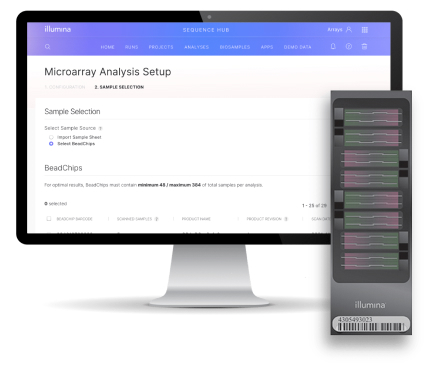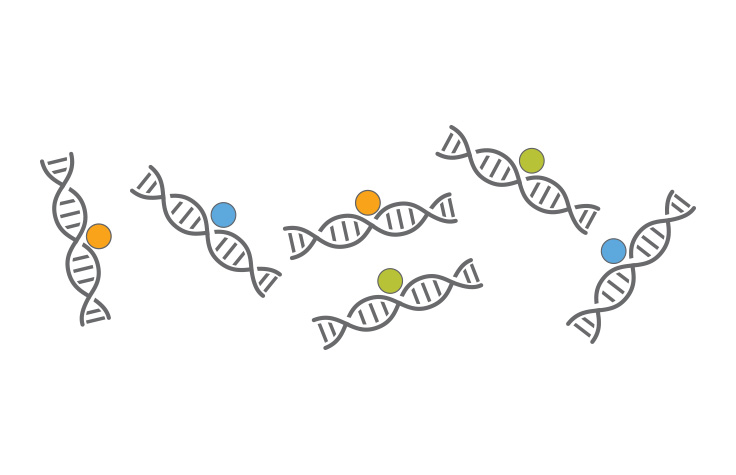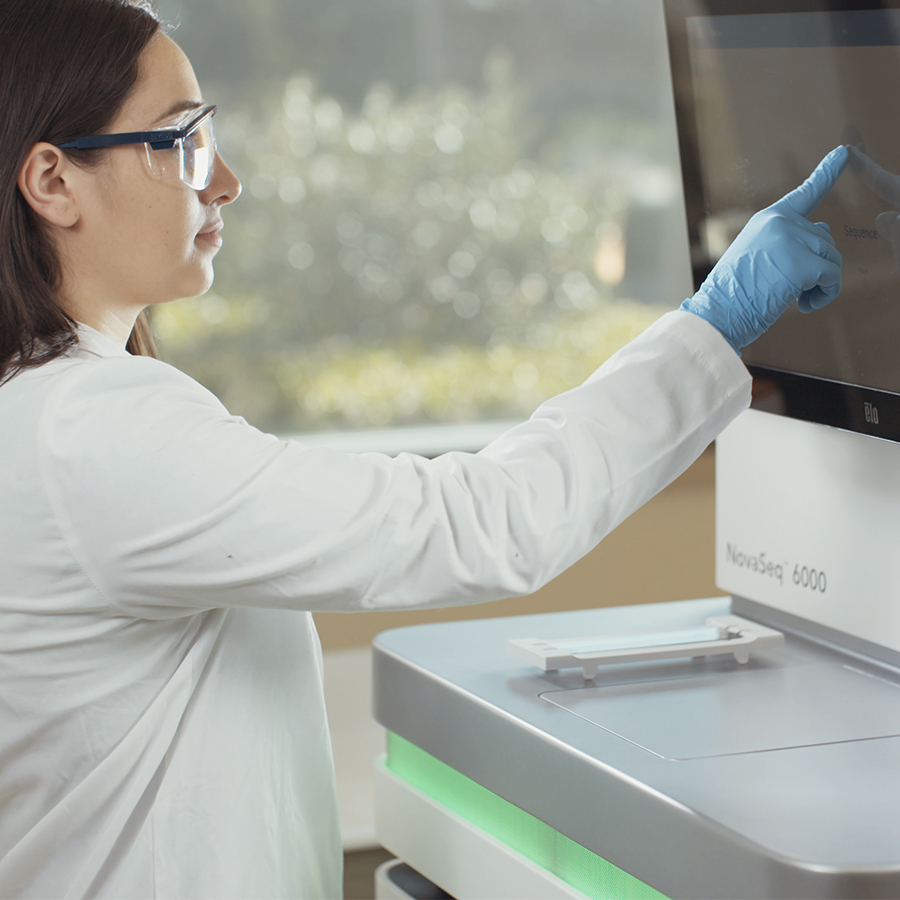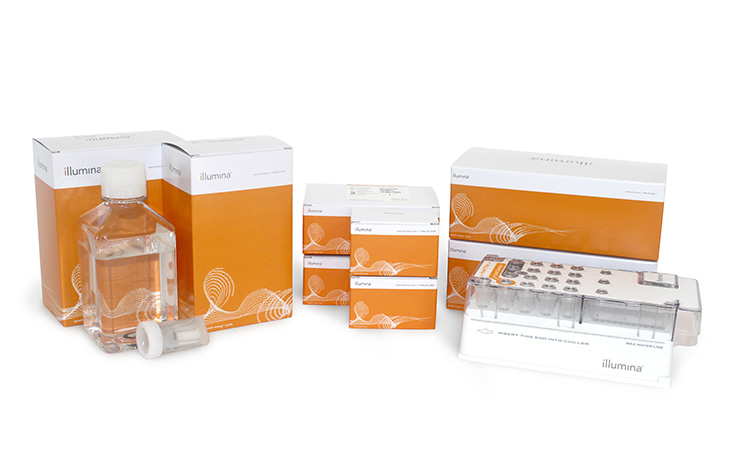Cardiovascular Disease Research
Advancing cardiovascular disease research with genomics
Next-generation sequencing and microarray methods and tools

Powerful tools for cardiovascular disease research
Next-generation sequencing (NGS) and microarrays are powerful tools to reveal how various genes and genetic variants affect cardiovascular disease. NGS-driven advances are enabled by a growing range of genomics tools and applications available to heart disease researchers. Even the discovery of a single gene or variant can reveal vast insights into the complex nature of cardiovascular disorders.

Estimating cardiovascular disease risk with polygenic risk scores
Polygenic risk scores (PRS) are an estimate of an individual's genetic risk for a specific trait or condition, obtained by aggregating and quantifying the effect of many common variants. Using PRS, in addition to typical screening methods, can help to identify individuals at risk for coronary artery disease who could have otherwise been missed.1
- PRS overview: Introduction to polygenic risk scores
- PRS research microarray: Infinium Global Diversity Array with PRS Content
- Analyzing PRS research data: Illumina PRS software

Going beyond DNA sequence changes
Epigenetics is the study of chemical modifications that occur to the genome that regulate gene expression at the DNA, RNA, and histone level through methylation, acetylation, ubiquitination, and phosphorylation. Epigenetic based therapies, or epi-drugs, continue to be explored and developed for potential treatment options. Some existing drugs used to treat heart failure have known epigenetic effects, including statins, metformin, apresoline, and SGLT2 inhibitors.2
- Epigenetics background: Introduction to epigenetics
- NGS solutions: ChIP-Seq for DNA-protein interaction studies; ATAC-Seq for chromatin accessibility analysis
- Array solutions: Methylation arrays

NGS and protein analysis
Proteomics is the study of a protein’s structure, function, and regulation. NGS-powered assays in proteomics can be used to better understand functional relationships between genes and proteins in bulk cell populations or even at the level of single cells. In some cases, this approach enables researchers to study these relationships within the context of preserved tissues.
- Proteomics background: Introduction to proteomics
- Bulk protein and sequencing: BEN-Seq app note
- Surface protein detection and sequencing data at the single-cell level: CITE-Seq
- Transcriptional activity within intact tissues: Spatial transcriptomics

Multiomics multiplies your discovery power
See how you can use multiomics to better connect genotype to phenotype and obtain a full cellular readout not found through single omics approaches.

Enhancing cardiovascular disease research with whole-genome sequencing
Whole-genome sequencing (WGS) is a powerful and comprehensive tool to analyze entire genomes, allowing researchers to identify inherited disorders such as those for heart disease. This approach has discovered causative gene variants in which prior genetic testing was inconclusive or negative.3,4 WGS can also pave the way for future applications to detect single nucleotide variants, insertions/deletions, copy number changes, and large structural variants.

Featured product
TruSight One Expanded Sequencing Panels
The TruSight One Expanded Panels provide clinical research labs with an affordable solution for managing a diverse assay portfolio. This assay sequences 181 cardiac genes related to 18 inherited cardiac conditions (ICCs) as well as other disease-associated regions of the exome. Investigators can choose to analyze all genes on a panel or focus on a specific subset. With a single assay, labs can expand existing menus, streamline workflows, or create an entire portfolio of sequencing options.
Cardiac conditions covered by TruSight One Expanded Sequencing Panels*
Arrhythmias
- Familial atrial fibrillation (21)
- Long QT syndromes (15)
- Brugada syndrome (13)
- CPVT: catecholaminergic polymorphic ventricular tachycardia (6)
- Short QT syndrome (4)
Cardiomyopathies
- Dilated cardiomyopathy (59 genes covered)
- Hypertrophic cardiomyopathy (50)
- ARVC: arrhythmogenic right ventricular cardiomyopathy (11)
- Noonan syndrome (11)
- Non-compaction cardiomyopathy (10)
- Restrictive cardiomyopathy (9)
Aortopathies
- Familial aortic aneurysm (16)
- Heritable thoracic aortic dissection (4)
- Loeys-Dietz syndrome (4)
- Aortic valve disease (3)
- Marfan syndrome (3)
Other cardiac conditions
- Structural heart disease (15)
- Familial hypercholesterolemia (10)
*Numbers represent number of associated genes on the TruSight One Expanded Panels.
THOUGHT LEADERSHIP
Featured cardiovascular disease research experts

The pharmacogenomics of cardiovascular disease therapy
Pharmacogenomics can reveal how individuals respond to drugs. In this interview, Dr. Marie-Pierre Dubé, PhD discusses clinical research that identified genotypes of cholesterol drug responders and nonresponders using Illumina technologies.

Leveraging sequencing and multiomics in cardiovascular research
This webinar discusses how genome sequencing and multiomics approaches such as epigenomics and single-cell transcriptomics are providing detailed molecular and cellular insights into cardiac disorders.

Using genetics to predict heart attack risk
In this podcast, Dr. Guillaume Paré discusses how genetics can help identify people at risk for familial hypercholesterolemia and early cardiovascular disease.
Learn more

Cardiovascular genetics for healthcare providers
Read about the benefits of cardiovascular genetics information for the diagnosis, management, and treatment of patients. Get updated guidelines from leading professional medical societies.

Cardiovascular genomics overview
See the compelling case for genetic sequencing to improve our understanding of cardiovascular related diseases.

Heart disease risk
Learn about genetic testing for cardiovascular disease awareness and health.
Related content
Precision genomics
Genomics-powered precision medicine can help pinpoint the underlying genetic causes of diseases.
Pharmacogenomics
Study how variations in the human genome can affect a person’s response to medications.
References
- Mujwara D, Henno G, Vernon ST, et al. Integrating a Polygenic Risk Score for Coronary Artery Disease as a Risk-Enhancing Factor in the Pooled Cohort Equation: A Cost-Effectiveness Analysis Study. J Am Heart Assoc. 2022;11(12):e025236. doi:10.1161/JAHA.121.025236
- Gorica E, Mohammed SA, Ambrosini S, Calderone V, Costantino S, Paneni F. Epi-Drugs in Heart Failure. Front Cardiovasc Med. 2022;9:923014. Published 2022 Jul 13. doi:10.3389/fcvm.2022.923014
- Kalayinia S, Goodarzynejad H, Maleki M, Mahdieh N. Next generation sequencing applications for cardiovascular disease. Ann Med. 2018;50(2):91-109. doi:10.1080/07853890.2017.1392595
- Bagnall RD, Ingles J, Dinger ME, et al. Whole Genome Sequencing Improves Outcomes of Genetic Testing in Patients With Hypertrophic Cardiomyopathy. J Am Coll Cardiol. 2018;72(4):419-429. doi:10.1016/j.jacc.2018.04.078